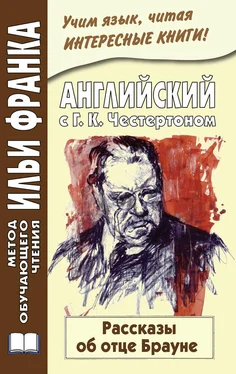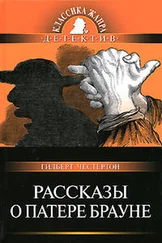
 The path up the hill to the churchyard was crooked but short; only under that stress of wind it seemed laborious and long. Far as the eye could see, farther and farther as they mounted the slope, were seas beyond seas of pines, now all aslope one way under the wind. And that universal gesture seemed as vain as it was vast, as vain as if that wind were whistling about some unpeopled and purposeless planet. Through all that infinite growth of grey-blue forests sang, shrill and high, that ancient sorrow that is in the heart of all heathen things. One could fancy that the voices from the under world of unfathomable foliage were cries of the lost and wandering pagan gods: gods who had gone roaming in that irrational forest, and who will never find their way back to heaven.
The path up the hill to the churchyard was crooked but short; only under that stress of wind it seemed laborious and long. Far as the eye could see, farther and farther as they mounted the slope, were seas beyond seas of pines, now all aslope one way under the wind. And that universal gesture seemed as vain as it was vast, as vain as if that wind were whistling about some unpeopled and purposeless planet. Through all that infinite growth of grey-blue forests sang, shrill and high, that ancient sorrow that is in the heart of all heathen things. One could fancy that the voices from the under world of unfathomable foliage were cries of the lost and wandering pagan gods: gods who had gone roaming in that irrational forest, and who will never find their way back to heaven.
“You see(понимаете; to see – видеть; смотреть; представить себе; считать; полагать ) ,” said Father Brown in low but easy tone(тихо, но спокойно сказал отец Браун; low – низкий; тихий ) , “Scotch people before Scotland existed were a curious lot(шотландцы до существования Шотландии были любопытными/странными людьми; curious – любопытный; любознательный; возбуждающий любопытство; чудной, необычный; lot – доля; судьба; группа /людей/ ) . In fact, they’re a curious lot still(собственно, они и сейчас странные) . But in the prehistoric times I fancy they really worshipped demons(но в доисторические времена они, я думаю, действительно поклонялись бесам; to fancy – очень хотеть; воображать; думать; to worship – поклоняться; почитать ) . That(вот) ,” he added genially(он добавил добродушно) , “is why they jumped at the Puritan theology(поэтому они так быстро приняли: «прыгнули в» пуританскую теологию) .”

 “You see,” said Father Brown in low but easy tone, “Scotch people before Scotland existed were a curious lot. In fact, they’re a curious lot still. But in the prehistoric times I fancy they really worshipped demons. That,” he added genially, “is why they jumped at the Puritan theology.”
“You see,” said Father Brown in low but easy tone, “Scotch people before Scotland existed were a curious lot. In fact, they’re a curious lot still. But in the prehistoric times I fancy they really worshipped demons. That,” he added genially, “is why they jumped at the Puritan theology.”
“My friend(друг мой) ,” said Flambeau, turning in a kind of fury(сказал Фламбо, оборачиваясь к нему с некоторым раздражением: «с чем-то вроде ярости»; kind – вид, разновидность ) , “what does all that snuff mean(ну и что же тогда означает этот нюхательный табак) ?”
“My friend,” replied Brown, with equal seriousness(ответил /отец/ Браун так же серьезно: «с неизменной серьезностью»; equal – равный, одинаковый; тождественный ) , “there is one mark of all genuine religions: materialism(у всех истинных религий есть одна /общая/ черта: материализм; genuine – истинный, подлинный, неподдельный ) . Now, devil-worship is a perfectly genuine religion(вот, а культ сатаны – истинная религия в полной мере) .”

 “My friend,” said Flambeau, turning in a kind of fury, “what does all that snuff mean?”
“My friend,” said Flambeau, turning in a kind of fury, “what does all that snuff mean?”
“My friend,” replied Brown, with equal seriousness, “there is one mark of all genuine religions: materialism. Now, devil-worship is a perfectly genuine religion.”
They had come up on the grassy scalp of the hill(они взобрались на вершину холма, покрытую травой; scalp – скальп; оголенная вершина горы ) , one of the few bald spots that stood clear of the crashing and roaring pine forest(одно из немногих мест без растительности, свободное от грохочущего и ревущего соснового леса; to crash – грохотать; to roar – реветь; pine – сосна ) . A mean enclosure, partly timber and partly wire, rattled in the tempest to tell them the border of the graveyard(невзрачная изгородь из проволоки и деревянных столбиков: «частично балки и частично проволока» дребезжала /на фоне/ бури, сообщая путникам: «им», где находится граница кладбища; enclosure – ограда, забор; timber – лесоматериалы; изгородь; балка; border – граница ) . But by the time Inspector Craven had come to the corner of the grave(но к тому моменту, когда инспектор Крейвен подошел к углу могилы) , and Flambeau had planted his spade point downwards and leaned on it(а Фламбо воткнул лопату /в землю/ и оперся на нее; point – острие ) , they were both almost as shaken as the shaky wood and wire(их обоих уже так сотрясало /от порывов ветра/, как лес и проволоку; to shake – трясти ) . At the foot of the grave grew great tall thistles, grey and silver in their decay(на краю могилы: «у основания могилы» росли большие высокие отцветающие серо-серебристые репейники; foot – ступня; фут; подножие; нижний край; to grow; decay – гниение; разложение; увядание ) . Once or twice, when a ball of thistledown broke under the breeze and flew past him(один или два раза, когда порыв ветра отрывал колючий шарик репейника и он летел мимо него; to break; to fly ) , Craven jumped slightly as if it had been an arrow(Крейвен слегка подпрыгивал, как будто это была стрела).

 They had come up on the grassy scalp of the hill, one of the few bald spots that stood clear of the crashing and roaring pine forest. A mean enclosure, partly timber and partly wire, rattled in the tempest to tell them the border of the graveyard. But by the time Inspector Craven had come to the corner of the grave, and Flambeau had planted his spade point downwards and leaned on it, they were both almost as shaken as the shaky wood and wire. At the foot of the grave grew great tall thistles, grey and silver in their decay. Once or twice, when a ball of thistledown broke under the breeze and flew past him, Craven jumped slightly as if it had been an arrow.
They had come up on the grassy scalp of the hill, one of the few bald spots that stood clear of the crashing and roaring pine forest. A mean enclosure, partly timber and partly wire, rattled in the tempest to tell them the border of the graveyard. But by the time Inspector Craven had come to the corner of the grave, and Flambeau had planted his spade point downwards and leaned on it, they were both almost as shaken as the shaky wood and wire. At the foot of the grave grew great tall thistles, grey and silver in their decay. Once or twice, when a ball of thistledown broke under the breeze and flew past him, Craven jumped slightly as if it had been an arrow.
Читать дальше
Конец ознакомительного отрывка
Купить книгу


 The path up the hill to the churchyard was crooked but short; only under that stress of wind it seemed laborious and long. Far as the eye could see, farther and farther as they mounted the slope, were seas beyond seas of pines, now all aslope one way under the wind. And that universal gesture seemed as vain as it was vast, as vain as if that wind were whistling about some unpeopled and purposeless planet. Through all that infinite growth of grey-blue forests sang, shrill and high, that ancient sorrow that is in the heart of all heathen things. One could fancy that the voices from the under world of unfathomable foliage were cries of the lost and wandering pagan gods: gods who had gone roaming in that irrational forest, and who will never find their way back to heaven.
The path up the hill to the churchyard was crooked but short; only under that stress of wind it seemed laborious and long. Far as the eye could see, farther and farther as they mounted the slope, were seas beyond seas of pines, now all aslope one way under the wind. And that universal gesture seemed as vain as it was vast, as vain as if that wind were whistling about some unpeopled and purposeless planet. Through all that infinite growth of grey-blue forests sang, shrill and high, that ancient sorrow that is in the heart of all heathen things. One could fancy that the voices from the under world of unfathomable foliage were cries of the lost and wandering pagan gods: gods who had gone roaming in that irrational forest, and who will never find their way back to heaven.






